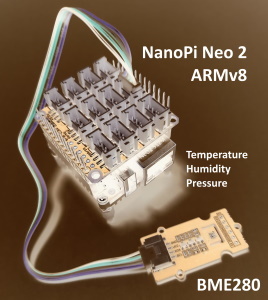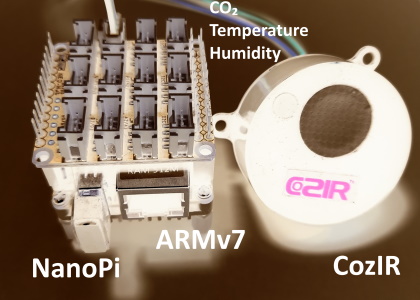dart_periphery 0.8.5-beta  dart_periphery: ^0.8.5-beta copied to clipboard
dart_periphery: ^0.8.5-beta copied to clipboard
dart_periphery is a Dart port of the native c-periphery library for Linux Peripheral I/O (GPIO, LED, PWM, SPI, I2C, MMIO and Serial peripheral I/O).
dart_periphery #

Introduction #
dart_periphery is a Dart port of the native c-periphery library for Linux Peripheral I/O (GPIO, LED, PWM, SPI, I2C, MMIO and Serial peripheral I/O). This package is specially intended for SoCs like Raspberry Pi, NanoPi, Banana Pi et al.
What is c-periphery? #
Abstract from the project web site:
c-periphery is a small C library for
- GPIO,
- LED,
- PWM,
- SPI,
- I2C,
- MMIO
- Serial peripheral I/O
interface access in userspace Linux. c-periphery simplifies and consolidates the native Linux APIs to these interfaces. c-periphery is useful in embedded Linux environments (including Raspberry Pi, BeagleBone, etc. platforms) for interfacing with external peripherals. c-periphery is re-entrant, has no dependencies outside the standard C library and Linux, compiles into a static library for easy integration with other projects, and is MIT licensed
dart_periphery binds the c-periphery library with the help of the dart:ffi mechanism. A glue library handles the Dart specific parts. Nevertheless, dart_periphery tries to be close as possible to the original library. See following documentation. Thanks to Vanya Sergeev for his great job!
Why c-periphery? #
The number of GPIO libraries/interfaces is becoming increasingly smaller.
- The famous wiringpi library is deprecated.
- GPIO sysfs is deprecated.
dart_periphery currently has beta status. Following interfaces are ported:
- GPIO
- I2C
- SPI
- Serial
- PWM
- Led (onboard leds)
Examples #
GPIO #

import 'package:dart_periphery/dart_periphery.dart';
import 'dart:io';
void main() {
var config = GPIOconfig();
config.direction = GPIOdirection.GPIO_DIR_OUT;
print('Native c-periphery Version : ${getCperipheryVersion()}');
print('GPIO test');
var gpio = GPIO(18, GPIOdirection.GPIO_DIR_OUT);
var gpio2 = GPIO(16, GPIOdirection.GPIO_DIR_OUT);
var gpio3 = GPIO.advanced(5, config);
print('GPIO info: ' + gpio.getGPIOinfo());
print('GPIO native file handle: ${gpio.getGPIOfd()}');
print('GPIO chip name: ${gpio.getGPIOchipName()}');
print('GPIO chip label: ${gpio.getGPIOchipLabel()}');
print('GPIO chip name: ${gpio.getGPIOchipName()}');
print('CPIO chip label: ${gpio.getGPIOchipLabel()}');
for (var i = 0; i < 10; ++i) {
gpio.write(true);
gpio2.write(true);
gpio3.write(true);
sleep(Duration(milliseconds: 200));
gpio.write(false);
gpio2.write(false);
gpio3.write(false);
sleep(Duration(milliseconds: 200));
}
gpio.dispose();
gpio2.dispose();
gpio3.dispose();
}
I2C #

import 'package:dart_periphery/dart_periphery.dart';
/// https://wiki.seeedstudio.com/Grove-TempAndHumi_Sensor-SHT31/
/// Grove - Temp&Humi Sensor(SHT31) is a highly reliable, accurate, quick response and
/// integrated temperature & humidity sensor.
void main() {
// Select the right I2C bus number /dev/i2c-?
// 1 for Raspbery Pi, 0 for NanoPi (Armbian), 2 Banana Pi (Armbian)
var i2c = I2C(1);
try {
print('I2C info:' + i2c.getI2Cinfo());
var bme280 = BME280(i2c);
var r = bme280.getValues();
print('Temperature [°] ${r.temperature.toStringAsFixed(1)}');
print('Humidity [%] ${r.humidity.toStringAsFixed(1)}');
print('Pressure [hPa] ${r.pressure.toStringAsFixed(1)}');
} finally {
i2c.dispose();
}
}
import 'package:dart_periphery/dart_periphery.dart';
/// Grove - Temp&Humi Sensor(SHT31) is a highly reliable, accurate,
/// quick response and integrated temperature & humidity sensor.
void main() {
// Select the right I2C bus number /dev/i2c-?
// 1 for Raspbery Pi, 0 for NanoPi (Armbian), 2 Banana Pi (Armbian)
var i2c = I2C(1);
try {
var sht31 = SHT31(i2c);
print(sht31.getStatus());
print('Serial number ${sht31.getSerialNumber()}');
print('Sensor heater active: ${sht31.isHeaterOn()}');
var r = sht31.getValues();
print('SHT31 [t°] ${r.temperature.toStringAsFixed(2)}');
print('SHT31 [%°] ${r.humidity.toStringAsFixed(2)}');
} finally {
i2c.dispose();
}
}
SPI #
import 'package:dart_periphery/dart_periphery.dart';
void main() {
// Select the right I2C bus number /dev/i2c-0
// 1 for Raspbery Pi, 0 for NanoPi
var spi = SPI(0, 0, SPImode.MODE0, 1000000);
try {
print('SPI info:' + spi.getSPIinfo());
var bme280 = BME280.spi(spi);
var r = bme280.getValues();
print('Temperature [°] ${r.temperature.toStringAsFixed(1)}');
print('Humidity [%] ${r.humidity.toStringAsFixed(1)}');
print('Pressure [hPa] ${r.pressure.toStringAsFixed(1)}');
} finally {
spi.dispose();
}
}
Serial #

import 'package:dart_periphery/dart_periphery.dart';
import 'dart:io';
///
/// [COZIR CO2 Sensor](https://co2meters.com/Documentation/Manuals/Manual_GC_0024_0025_0026_Revised8.pdf)
///
void main() {
print('Serial test - COZIR CO2 Sensor');
var s = Serial('/dev/serial0', Baudrate.B9600);
try {
print('Serial interface info: ' + s.getSerialInfo());
// Return firmware version and sensor serial number - two lines
s.writeString('Y\r\n');
var event = s.read(256, 1000);
print(event.toString());
// Request temperature, humidity and CO2 level.
s.writeString('M 4164\r\n');
// Select polling mode
s.writeString('K 2\r\n');
// print any response
event = s.read(256, 1000);
print('Response ${event.toString()}');
sleep(Duration(seconds: 1));
for (var i = 0; i < 5; ++i) {
s.writeString('Q\r\n');
event = s.read(256, 1000);
print(event.toString());
sleep(Duration(seconds: 5));
}
} finally {
s.dispose();
}
}
Led #
import 'package:dart_periphery/dart_periphery.dart';
import 'dart:io';
void main() {
/// Nano Pi power led - see 'ls /sys/class/leds/'
var led = Led('nanopi:red:pwr');
try {
print('Led handle: ${led.getLedInfo()}');
print('Led name: ${led.getLedName()}');
print('Led brightness: ${led.getBrightness()}');
print('Led maximum brightness: ${led.getMaxBrightness()}');
var inverse = !led.read();
print('Original led status: ${(!inverse)}');
print('Toggle led');
led.write(inverse);
sleep(Duration(seconds: 5));
inverse = !inverse;
print('Toggle led');
led.write(inverse);
sleep(Duration(seconds: 5));
print('Toggle led');
inverse = !inverse;
led.write(inverse);
sleep(Duration(seconds: 5));
print('Toggle led');
led.write(!inverse);
} finally {
led.dispose();
}
}
PWM #
Ensure that PWM is correct enabled. e.g. see the following documentation for the Raspberry Pi.
import 'package:dart_periphery/dart_periphery.dart';
import 'dart:io';
void main() {
var pwm = PWM(0, 0);
try {
print(pwm.getPWMinfo());
pwm.setPeriodNs(10000000);
pwm.setDutyCycleNs(8000000);
print(pwm.getPeriodNs());
pwm.enable();
print("Wait 20 seconds");
sleep(Duration(seconds: 20));
pwm.disable();
} finally {
pwm.dispose();
}
}
Install Dart on Raspian and Armbian #
ARMv7 #
cd ~
wget https://storage.googleapis.com/dart-archive/channels/stable/release/2.10.5/sdk/dartsdk-linux-arm-release.zip
unzip dartsdk-linux-arm-release.zip
sudo mv dart-sdk /opt/
sudo chmod +rx /opt/dart-sdk
ARMv8 #
wget https://storage.googleapis.com/dart-archive/channels/stable/release/2.10.5/sdk/dartsdk-linux-arm64-release.zip
unzip dartsdk-linux-arm64-release.zip
sudo mv dart-sdk /opt/
sudo chmod +rx /opt/dart-sdk
nano ~/.profile
add for bash as default
nano ~/.profile
following command
export PATH=$PATH:/opt/dart-sdk/bin
at the end of the file and call
source ~/.profile
to apply the changes.
Test the installion
root@nanopineo2:~# dart --version
Dart SDK version: 2.10.5 (stable) (Tue Jan 19 13:05:37 2021 +0100) on "linux_arm64"
Native library #
Currently dart_periphery ships with prebuild native libraries for ARMv7 and ARMv8 in two flavours - static and dynamic linking.
dart_periphery_32.1.0.0.so➔/usr/local/lib/libperiphery.sodart_periphery_static_32.1.0.0.so(includes libperiphery.a)dart_periphery_64.1.0.0.so➔/usr/local/lib/libperiphery.sodart_periphery_static_64.1.0.0.so(includes libperiphery.a)
These glue libraries contain the Dart specific part to the c-periphery library. As default dart_periphery loads the static linked library.
Following methods can be used to overwrite the loading of the static linked library. But be aware, any of these methods must be called before any dart_periphery interface is used!
useSharedLibray();
If this method is called, dart_periphery loads the shared library. For this case c-pheriphery must be installed as a shared library. See for details - section Shared Library.
The glue library, flavour shared, can be rebuild with following command:
pub global activate dart_periphery
pub global run dart_periphery:build_lib
To load a custom library call
setCustomLibrary(String absolutePath)
This method can be helpful in any case of a problem and for a currently not supported platform - e.g x86 based SoC
For building a custom library please review following information
- make file
- c-periphery - section Static or Shared Library.
For a dart native binary, which can be deployed
dart compile exe i2c_example.dart
call
void useLocalLibrary([bool staticLib = true])
to use the static or shared glue library with the correct bitness. The appropriate library should be in same dirctory as the exe.
Tested hardware #
Raspberry Pi 3 Model B (Raspian)
NanoPi with a Allwinner H3, Quad-core 32-bit CPU, OS: Armbian
NanoPi M1 with a Allwinner H3, Quad-core 32-bit CPU: OS Armbian
NanoPi Neo2 with a Allwinner H5, Quad-core 64-bit CPU, OS: Armbian
Banana Pi BPI-M1 with a Allwinner A20 Dual-core, OS: Armbian
Next steps #
Port the missing c-periphery bindings
- MMIO
Improvements
- Add GPIO documentation for different SoCs.
- Writing API test cases.
- Improve build process of the native libraries.
Future steps #
- If possible, developing a flutter desktop app for the Raspberry Pi with bindings to dart_periphery.
- Port hardware devices from the mattjlewis / diozero Java Project to dart_periphery: e.g. BME680, SGP30 etc. In most cases it is easy to find code snippets for the most sensors, but the implementations of the diozero Project have a high level.
Help wanted #
- Testing dart_periphery on different SoC platforms
- Documentation review - I am not a native speaker.
- Code review - this is my first public Dart project, I am a Java developer and probably I tend to solve problems rather in the Java than in the Dart way.